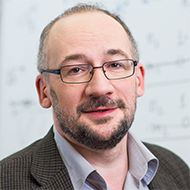- A
- A
- A
- ABC
- ABC
- ABC
- А
- А
- А
- А
- А
- HSE University
- Faculties
- Faculty of Computer Science
- School of Data Analysis and Artificial Intelligence
- News
- Lectures by Bernhard Ganter at HSE
-
The School
Pokrovsky boulevard, 11, room S938, Moscow, Russia, 109028
Phone: +7 (495) 772-95-90*27319
The School of Data Analysis and Artificial Intelligence was created in 2014 as part of the Department of Data Analysis and Artificial Intelligence. The school consists of world-renowned researchers who actively participate in international research projects.
Acquaye F. L., Kertesz-Farkas A., Stafford Noble W.
Journal of Proteome Research. 2023. Vol. 22. No. 2. P. 577-584.
Vasilii A. Gromov, Yury N. Beschastnov, Korney K. Tomashchuk.
PeerJ Computer Science. 2023. Vol. 9. No. .
Makhalova T., Kuznetsov S., Napoli A.
Data Mining and Knowledge Discovery. 2022. P. 108-145.
Dudyrev E., Semenkov Ilia, Kuznetsov S. et al.
Plos One. 2022. Vol. 17. No. 10.
Zhirayr Hayrapetyan, Nascimento S., Trevor F. et al.
In bk.: Information Systems and Technologies: WorldCIST 2022, Volume 2. Iss. 469. Springer, 2022. P. 141-147.
Dudyrev F., Neznanov A., Anisimova K.
In bk.: Artificial Intelligence in Education. Posters and Late Breaking Results, Workshops and Tutorials, Industry and Innovation Tracks, Practitioners’ and Doctoral Consortium -23rd International Conference, AIED 2022, Durham, UK, July 27–31, 2022, Proceedings, Part II. Springer, 2022. P. 436-439.
Egurnov D., Точилкин Д. С., Ignatov D. I.
In bk.: Complex Data Analytics with Formal Concept Analysis. Springer, 2022. P. 239-258.
Egurnov D., Ignatov D. I.
Automation and Remote Control. 2022. Vol. 83. No. 6. P. 894-902.
Kudriavtseva P., Kashkinov M., Kertész-Farkas A.
Journal of Proteome Research. 2021. Vol. 20. No. 10. P. 4708-4717.
Kanovich M., Kuznetsov S., Scedrov A.
Information and Computation. 2022. Vol. 287.

Lectures by Bernhard Ganter at HSE
Bernhard Ganter received his PhD in 1974 from the University of Darmstadt, Germany. He became a Professor of mathematics in 1978, and a Full Professor at Dresden University in 1993. He also worked as Head of the Algebra Institute in the Math department. Originally, his research interests were in discrete mathematics and in universal algebra. Around 1980, he was a member of Rudolf Wille's research group that invented Formal Concept Analysis. This field has since then turned out to be useful for the formal treatment of data and knowledge. Currently, he is working on connections to other fields of knowledge processing. Professor Ganter is author of numerous articles and reports and invited speaker at many international conferences.
The book ‘Formal Concept Analysis: Mathematical Foundations by Bernhard Ganter and Rudolf Wille became one of the most popular textbooks on formal concept analysis. It gives a systematic presentation of the mathematical foundations and their relations to applications in computer science, especially in data analysis and knowledge processing.
Bernhard Ganter is founder and director of a unique mathematical museum Erlebnisland Mathematik in Dresden. The museum's exhibits represent mathematical theories, facts and results that you can feel, see, hear, or experience at your own risk.
- About
- About
- Key Figures & Facts
- Sustainability at HSE University
- Faculties & Departments
- International Partnerships
- Faculty & Staff
- HSE Buildings
- HSE University for Persons with Disabilities
- Public Enquiries
- Studies
- Admissions
- Programme Catalogue
- Undergraduate
- Graduate
- Exchange Programmes
- Summer Schools
- Semester in Moscow
- Business Internship
- © HSE University 1993–2025 Contacts Copyright Privacy Policy Site Map
- Edit

